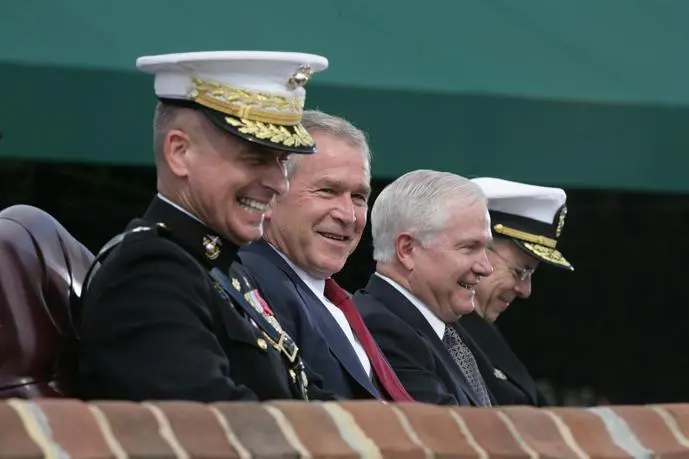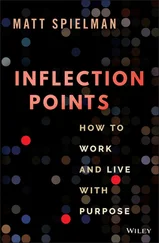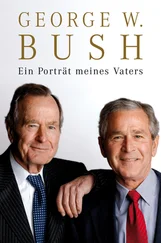I thanked the sheikhs for their hospitality and their bravery in the war on terror. “If you need us,” one sheikh jubilantly told me, “my men and I will go to Afghanistan!”

Washington was abuzz when Petraeus and Crocker arrived on September 10 to testify before Congress and make recommendations on the way forward in Iraq. For months, Democrats had pledged to use their testimony to cut off funding for the war. In July, the New York Times declared the cause in Iraq “lost” and called for an all-out withdrawal, despite the likelihood that an immediate pullout could result in “further ethnic cleansing, even genocide” and “a new stronghold from which terrorist activity could proliferate.” It was stunning to see the Times , which rightly championed human rights, advocate a policy it admitted could lead to genocide.
The morning of the hearings, the left-wing group MoveOn.org ran a full-page newspaper ad that read, “General Petraeus or General Betray Us? Cooking the Books for the White House.” It was an astonishing character attack on a four-star general. It was also a political mistake. Democrats in Congress tried to avoid endorsing the ad while supporting the antiwar sentiment behind it. One New York senator denounced the ad but said Petraeus’s report required “the willing suspension of disbelief.”
For their part, Petraeus and Crocker were stoic, resilient, and highly credible. They reported the facts. Iraqi civilian deaths had declined 70 percent in Baghdad and 45 percent across the country. Deaths from sectarian violence had plunged 80 percent in Baghdad and 55 percent across the country. IED attacks had dropped by a third, and car bombings and suicide attacks had declined almost 50 percent. The Awakening movement we had witnessed in Anbar had spread to Diyala Province and the Sunni neighborhoods of Baghdad. The picture was unmistakable: The surge was working.
Two nights after the testimony, I spoke to the nation. “Because of this success, General Petraeus believes we have now reached the point where we can maintain our security gains with fewer American forces,” I said. “… The principle guiding my decisions on troop levels in Iraq is ‘return on success.’ The more successful we are, the more American troops can return home.”
The most quoted phrase in the speech was “return on success.” The clever play on words was suggested by Ed Gillespie, a smart and valued friend who agreed to lead my communications team when Dan Bartlett returned home to Texas. But in my mind, the most important message was that we were keeping as many troops in Iraq as our commanders needed, for as long as they needed them.
The day of my speech, I heard that General Petraeus’s friend, retired General Jack Keane, was meeting with Dick Cheney. I liked and respected Jack. He had provided valuable advice during the decision-making process and supported the surge publicly. I asked Jack to convey a personal message from me to General Petraeus: “I waited over three years for a successful strategy. And I’m not giving up on it prematurely. I am not reducing further unless you are convinced that we should reduce further.”

Three weeks after the much-awaited testimony, I rode to the military parade grounds at Fort Myer, Virginia, to say farewell to a friend.
Shortly after I announced the surge, Bob Gates had recommended that I not renominate General Pete Pace to a second term as chairman of the Joint Chiefs. The environment on Capitol Hill was hostile, and Bob had heard from several senators—especially Carl Levin, the new chairman of the Senate Armed Services Committee—that Pete’s confirmation hearing would be contentious. The concern was that senators would use him as a punching bag for all their frustrations with Iraq.
I admired Pete. I had benefited from his advice for six years. I knew how much our troops loved him. I wanted to end the presidency with my friend as chairman. But I pictured the spectacle of the hearing—protestors yelling and senators preening for the cameras, all ending with a negative vote that would humiliate Pete. I reluctantly agreed with Bob’s judgment. I nominated Mike Mullen, a fine Navy admiral, to be the next chairman.
Pete never complained. He served nobly to the end. After turning over his duties, he removed the four stars from his uniform, pinned them to a note card, and left it at the foot of the Vietnam Memorial near the name of a Marine lost four decades earlier. He brought no cameras or press. Later, the card was found at the foot of the wall. It read, “To Guido Farinaro, USMC, These [stars] are yours, not mine! With love and respect, Your platoon leader, Pete Pace.”

At the 2007 retirement ceremony of Joint Chiefs Chairman Pete Pace ( left ). Next to us are his successor, Mike Mullen ( right ), and Bob Gates. White House/David Bohrer
I ached for Pete and his family. When I presented him with a well-deserved Presidential Medal of Freedom in 2008, it only partly assuaged my regret.

The momentum of the surge continued into 2008. By spring more than ninety thousand Iraqis, both Sunni and Shia, had joined Concerned Local Citizens groups like those that had started in Anbar. Many of these forces, now known as Sons of Iraq, integrated into the increasingly effective army and police force, which had grown to more than 475,000. They drove the remaining hard-core insurgents and al Qaeda from their strongholds. The terrorists resorted to using children and the mentally handicapped as suicide bombers, revealing both their moral depravity and their inability to recruit.
Just as counterinsurgency experts predicted, the security gains of 2007 translated into political progress in 2008. Free from the nightmare of sectarian violence, the Iraqis passed a flurry of major legislation, including a law resolving the status of former Baath Party members, a national budget, and legislation paving the way for provincial elections. While the government still had work to do on some key measures, including an oil-revenue-sharing law, the Iraqis’ political performance was a remarkable feat given all that they had endured.
The biggest concern in the spring of 2008 was the presence of Shia extremists. While security in most of Iraq improved during the surge, Shia extremists, many with close ties to Iran, had taken over large parts of Basra, Iraq’s second-largest city.
On March 25, 2008, Iraqi forces attacked the extremists in Basra. Prime Minister Maliki traveled to the south to oversee the operation. Most of my national security team was somewhere between anxious and petrified. The military worried that Maliki did not have a well-defined plan. Some in the embassy questioned whether he had enough support within the Iraqi government. The CIA gave Maliki’s assault a bleak prognosis.
I felt differently. Maliki was leading. For almost two years, I had urged him to show his evenhandedness. “A Shia murderer is as guilty as a Sunni murderer,” I said many times. Now he had followed through in a highly public way. When Steve Hadley and Brett McGurk came to the Oval Office the morning after Maliki launched the attack, I said, “Don’t tell me this is a bad thing. Maliki said he would do this and now he’s doing it. This is a defining moment. We just need to help him succeed.”
The assault was far from textbook, but it worked. The Iraqi forces brought security to Basra. Their success stunned Shia radicals like Moqtada al Sadr and their backers in Iran. Above all, the Basra operation established Maliki as a strong leader. The prime minister had reached a major decision point of his own, and he had made the right call.
Читать дальше













